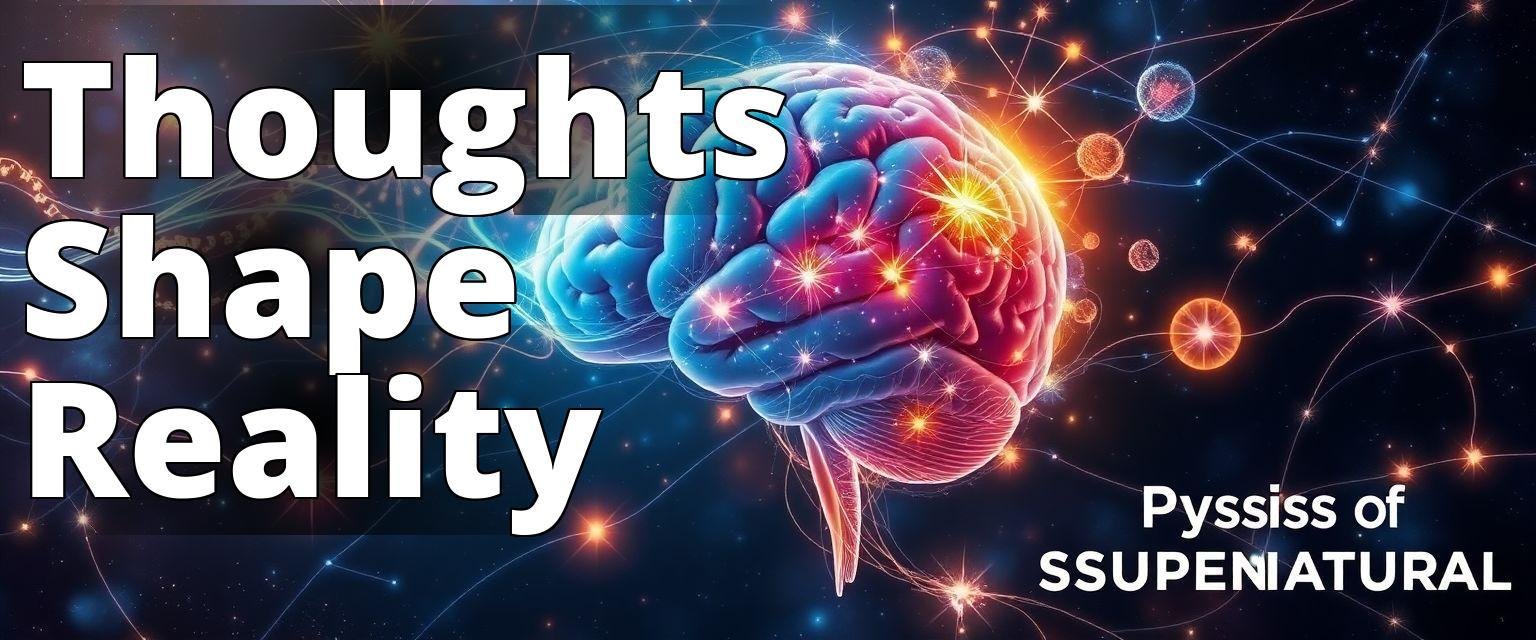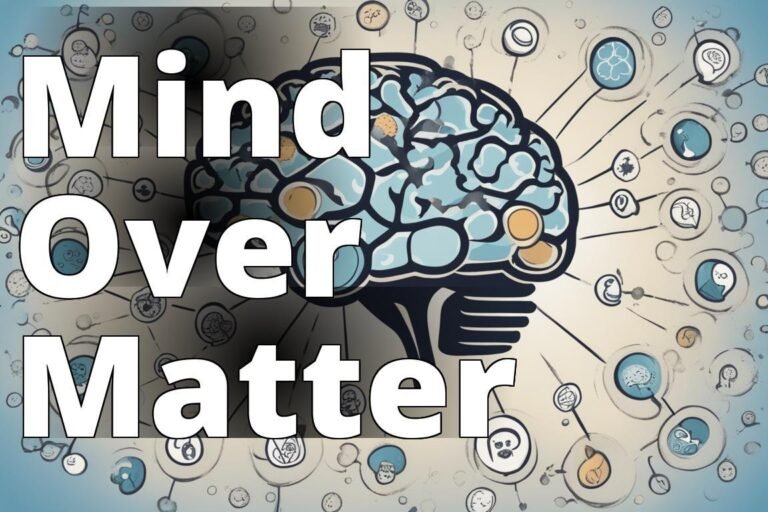The Science Behind the Power of Thought
What if I told you that the thoughts swirling in your mind could shape not just your reality, but the very fabric of the universe? It’s a bold claim, but one that has intrigued scientists, philosophers, and spiritual leaders for centuries. The power of thought is not some fanciful concept pulled from the annals of new-age rhetoric; it is a tangible force with the potential to influence everything from our health to our relationships and even the cosmos itself.
Impact of Thoughts on Our Body
Explore how thoughts influence your physical well-being and overall life experience.
– Thoughts can trigger biological responses, impacting health by affecting stress levels and immune function.
– Positive thinking fosters emotional resilience, which can lead to improved relationships and social interactions.
– The connection between mind and body suggests that our beliefs and intentions can shape our physical reality and experiences in the universe.
The Science Behind the Power of Thought
Exploring the scientific underpinnings of thought’s power reveals a fascinating interplay between mind and matter. At its core, the concept hinges on the idea that thoughts are not merely abstract notions but forms of energy. This notion finds support in quantum physics, which suggests that the act of observation can alter the state of a quantum systema phenomenon known as the observer effect.

For instance, consider the famous double-slit experiment, where particles behave differently when observed. This experiment has led some to believe that consciousness, or thought, can influence physical reality. Dr. Dean Radin, a scientist known for his work on the interaction between consciousness and the physical world, argues that our expectations can indeed shape our experiences.
Insider Tip: Dr. Joe Dispenza, author and researcher, emphasizes the importance of harnessing thought to rewrite our neurological pathways, suggesting that with intention, we can rewire our brains to optimize our mental and physical health.
For further exploration, check out this article on the observer effect from Scientific American.
The Power of Thought and the Body
Have you ever noticed how your body tenses when you’re stressed or how you feel lighter and more energetic when you’re happy? This is a testament to the profound connection between our thoughts and bodily functions. The mind-body connection is not just anecdotal; it’s backed by substantial research.

A study conducted by Dr. Candace Pert, a neuroscientist and pharmacologist, revealed that neuropeptidesthe chemicals triggered by emotionsare found throughout the body, not just the brain. This discovery underlines how our thoughts and feelings can directly influence our physical state. Stress, for instance, can suppress the immune system, while positive thinking has been shown to promote healing and well-being.
Insider Tip: Incorporating mindfulness and positive affirmations into your daily routine can help harness the power of thought to improve your physical health.
If you want to dive deeper into the science of how stress affects your health, Harvard Health Publishing provides a detailed overview here.
The Power of Thought and the Mind
The mind is the seat of thought, where the intangible becomes tangible. But how exactly do our thoughts impact our mental state? Cognitive Behavioral Therapy (CBT) is a psychological treatment that demonstrates the power of thought in altering mental health. CBT operates on the premise that negative thought patterns can lead to emotional distress and maladaptive behaviors.

By actively changing these thought patterns, individuals can alleviate symptoms of anxiety and depression. A personal account: I once struggled with debilitating anxiety. It wasn’t until I engaged in CBT that I began to see the transformative power of reframing my thoughts. The practice taught me that by altering my internal dialogue, I could significantly improve my mental well-being.
Insider Tip: To leverage thought power for mental health, practice identifying and challenging negative thoughts, replacing them with more balanced and constructive ones.
For more insights into CBT, check out this informative resource from the American Psychological Association.
The Power of Thought and the Spirit
While science provides a framework for understanding the power of thought, spirituality offers a broader, often more abstract perspective. Many spiritual traditions assert that thought is a key force in shaping our spiritual experiences and connection to a higher power.

Consider the practice of meditation, a cornerstone in many spiritual traditions. Through meditation, practitioners aim to quiet the mind, focusing thoughts to achieve a deeper state of consciousness or spiritual awakening. This practice has been associated with increased spiritual awareness and a sense of inner peace. As someone who has dabbled in meditation, I can attest to its power in fostering a sense of connection beyond the self.
Insider Tip: Experiment with different meditation techniques to find one that resonates with you, whether it’s mindfulness, transcendental, or guided imagery.
For a compelling read on the intersection of thought and spirituality, explore this article on meditation’s effects from Psychology Today.
The Power of Thought and Relationships
Thoughts shape not only our personal experiences but also our interactions with others. The way we perceive and think about those around us can influence our relationships in profound ways.

Consider the concept of self-fulfilling prophecies in relationships. If you approach a relationship with the belief that it will fail, this negative thought pattern can lead to behaviors that ultimately sabotage the relationship. Conversely, positive expectations can foster nurturing and supportive interactions. Reflecting on my own experiences, I noticed a significant improvement in my relationships once I began to consciously cultivate positive thoughts about others.
Insider Tip: Practice gratitude and positive affirmation in your relationships. Acknowledging the positive traits of those around you can strengthen bonds and improve interactions.
To better understand the psychological dynamics at play, refer to this study on self-fulfilling prophecies in relationships.
The Power of Thought and the Universe
The idea that our thoughts can influence the universe may seem far-fetched, but it’s a notion that has gained traction, particularly in the realm of the Law of Attraction. This philosophy posits that positive or negative thoughts bring positive or negative experiences into a person’s life.

Consider the story of Jim Carrey, who famously wrote himself a $10 million check for ‘acting services rendered’ and dated it for Thanksgiving 1995. He credits this act of visualization and positive thinking for manifesting his success. Skeptics may dismiss such stories as coincidence, but the underlying principle is simple: our thoughts can set the intention for what we receive.
Insider Tip: Experiment with visualization techniques to manifest your goals. Envision the life you want and use your thoughts to attract those experiences.
For a comprehensive exploration of the Law of Attraction, visit this resource on the philosophy’s principles and applications.
The Power of Thought and You
Ultimately, the greatest testament to the power of thought lies in its impact on you, the individual. Personal growth and transformation are often sparked by a shift in mindset.

Reflect on a time when changing your perspective altered your life path. Perhaps it was a career decision influenced by newfound confidence or a personal relationship deepened by empathy and understanding. My own journey into writing was catalyzed by a single thought: “I can make a difference with my words.” This simple yet powerful belief propelled me into a fulfilling career that continues to evolve.
Insider Tip: Cultivate a growth mindset. Embrace challenges as opportunities for development, and use the power of thought to guide your journey.
For more on developing a growth mindset, consider this guide by Mindset Works.
Conclusion
The power of thought is a multifaceted force that weaves through every aspect of our lives. From shaping our health and relationships to influencing the universe, our thoughts hold the potential to transform our reality. As we navigate the complexities of life, it’s crucial to harness this power mindfully, steering our thoughts toward positive, constructive outcomes. The question remains: how will you wield the power of your thoughts to shape your destiny?
Questions & Answers
Q. How do our thoughts influence our body’s physical state?
A. Our thoughts can lead to chemical changes affecting our physical health.
Q. What role does the subconscious play in body-thought connections?
A. The subconscious mind processes thoughts that can manifest in bodily responses.
Q. How can negative thoughts affect our physical well-being?
A. Negative thoughts can trigger stress responses that harm our physical health.
Q. Who can benefit from understanding the mind-body connection?
A. Anyone interested in improving their health can benefit from this knowledge.
Q. What are some practical ways to harness positive thoughts?
A. Practices like meditation and mindfulness can foster positive thinking.
Q. Can I change my body by simply changing my thoughts?
A. While thoughts influence health, consistent action is also necessary for change.







